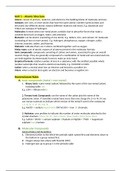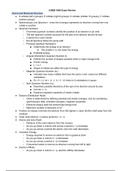Gammon Study guides, Class notes & Summaries
Looking for the best study guides, study notes and summaries about Gammon? On this page you'll find 48 study documents about Gammon.
Page 3 out of 48 results
Sort by

-
CHEM 1040 exam full study guide
- Exam (elaborations) • 22 pages • 2020
-
- $3.99
- 3x sold
- + learn more
These notes cover all the units of CHEM 1040 in-depth including practice exam questions & solutions, diagrams, and easy to understand explanations. It focuses on the tested knowledge from my 2019 exam. Covers many of these topics and more: - Quantum numbers - Trends - Organic Nomenclature - VESPR - Spectroscopy - Intermolecular forces (hydrogen, dipole, etc) - Stoichiometry - Resonance - Equilibrium - Reaction types - K constant - Le Chatelier's principle - Hybridization - O...
Review of concepts covered in CHEM 1040 - General Chemistry I, taught at the University of Guelph. All typed notes.

-
Rate constants and Order of reactions
- Class notes • 39 pages • 2020
-
Available in package deal
-
- $3.49
- + learn more
k is the first-order rate constant, which has units of 1/s. The method of determining the order of a reaction is known as the method of initial rates. The overall order of a reaction is the sum of all the exponents of the concentration terms in the rate equation.

-
Collision Theory
- Class notes • 31 pages • 2020
-
Available in package deal
-
- $3.49
- + learn more
Collision theory, theory used to predict the rates of chemical reactions, particularly for gases. The collision theory is based on the assumption that for a reaction to occur it is necessary for the reacting species (atoms or molecules) to come together or collide with one another.There are three important parts to collision theory, that reacting substances must collide, that they must collide with enough energy and that they must collide with the correct orientation.

-
Half life reactions
- Class notes • 23 pages • 2020
-
Available in package deal
-
- $3.99
- + learn more
The half-life of a reaction, t1/2, is the amount of time needed for a reactant concentration to decrease by half compared to its initial concentration. Its application is used in chemistry and medicine to predict the concentration of a substance over time.

-
Nuclear Chemistry
- Class notes • 30 pages • 2020
-
Available in package deal
-
- $3.49
- + learn more
Nuclear chemistry is the sub-field of chemistry dealing with radioactivity, nuclear processes, and transformations in the nuclei of atoms, such as nuclear transmutation and nuclear properties. ... An important area is the behavior of objects and materials after being placed into a nuclear waste storage or disposal site.Many entities can be involved in nuclear reactions. The most common are protons, neutrons, alpha particles, beta particles, positrons, and gamma rays.

-
Radiocarbon
- Class notes • 22 pages • 2020
-
Available in package deal
-
- $3.49
- + learn more
Radiocarbon dating (also referred to as carbon dating or carbon-14 dating) is a method for determining the age of an object containing organic material by using the properties of radiocarbon, a radioactive isotope of carbon

-
Intergrated rate laws
- Class notes • 23 pages • 2020
-
Available in package deal
-
- $3.49
- + learn more
The rate law is a differential equation, meaning that it describes the change in concentration of reactant(s) per change in time. Using calculus, the rate law can be integrated to obtain an integrated rate equation that links concentrations of reactants or products with time directly.

-
Chemical reaction rate
- Class notes • 16 pages • 2020
-
Available in package deal
-
- $3.99
- + learn more
Reaction rate, in chemistry, the speed at which a chemical reaction proceeds. It is often expressed in terms of either the concentration (amount per unit volume) of a product that is formed in a unit of time or the concentration of a reactant that is consumed in a unit of time.

-
Activation energy
- Class notes • 16 pages • 2020
-
Available in package deal
-
- $3.49
- + learn more
Activation energy, in chemistry, the minimum amount of energy that is required to activate atoms or molecules to a condition in which they can undergo chemical transformation or physical transport.The role of activation energy in a chemical reaction is to start the reaction by arranging the reactants appropriately and breaking their existing...

Study stress? For sellers on Stuvia, these are actually golden times. KA-CHING! Earn from your study resources too and start uploading now. Discover all about earning on Stuvia



